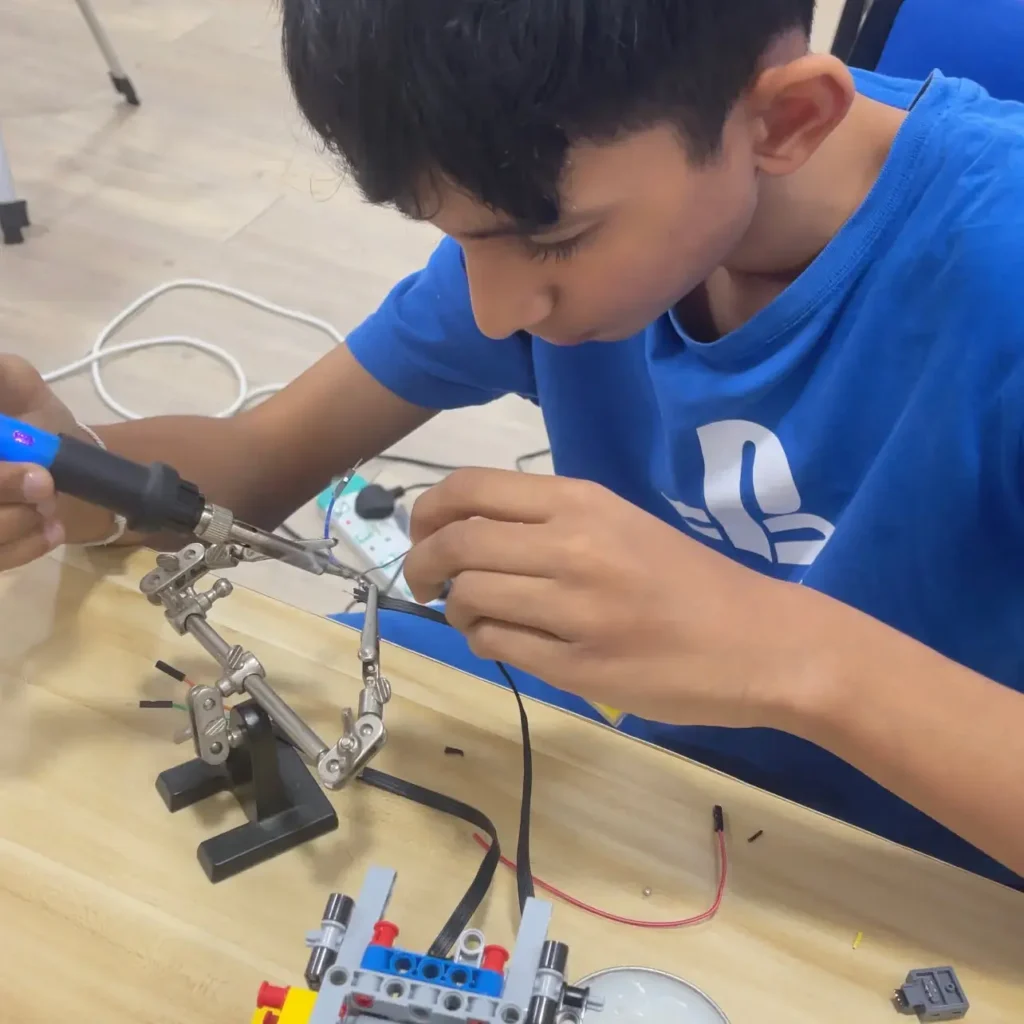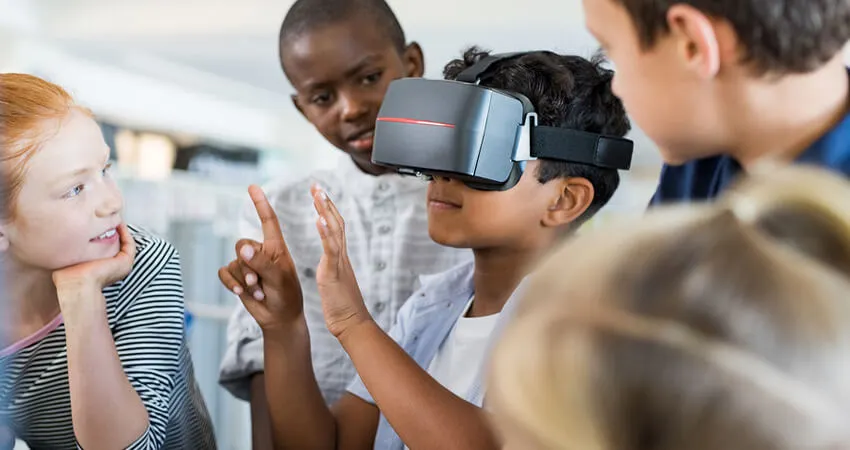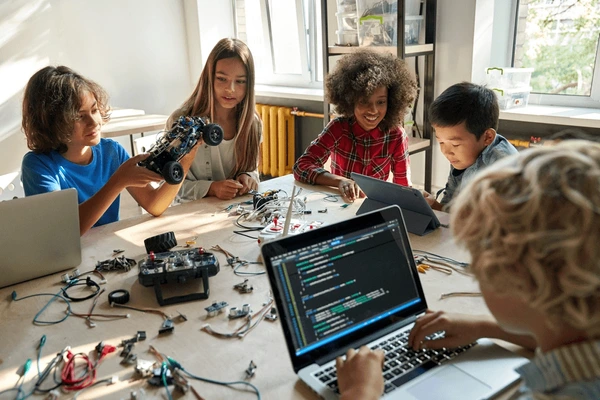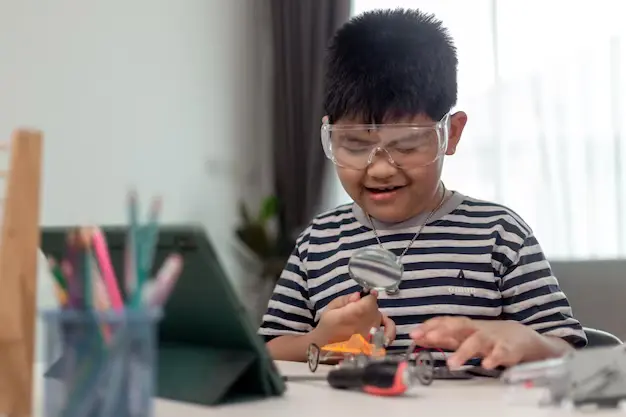If someone had told me 15 years ago that kids would be building apps, creating robots from scratch, and pitching business ideas before their SPM, I would’ve laughed and said, “Do they also have time to clean their rooms?”
But here we are. The coding benefits for kids are bigger than ever — it has moved from being “something computer geeks do” to a superpower every child can have.
And when I say superpower, I don’t just mean making a website — I mean the kind of thinking, problem-solving, and creativity that turns our kids into tomorrow’s innovators and entrepreneurs.
As a coding trainer specializing in robotics, I’ve watched shy, quiet kids become confident creators who pitch ideas with more energy than a Shark Tank contestant. (If your child is shy, coding can actually help them communicate better — I’ve seen it happen countless times.) Let’s talk about why coding benefits for kids go far beyond just learning a tech skill.
Coding Benefits for Kids: How It Fosters Innovation and Entrepreneurship?
- Coding Builds the “Idea Muscle”
- Coding Teaches Problem-Solving Under Pressure
- Coding Encourages Creativity, Not Just Logic
- Coding Turns Ideas Into Real-World Projects
- Coding Builds Confidence to Pitch and Share Ideas
- Entrepreneurship Starts Young
- Entrepreneurial Skills Coding Teaches
- How Parents Can Encourage Innovation Through Coding
- How to Get Your Child Started

Coding Builds the “Idea Muscle”
Innovation starts with ideas, and one of the biggest coding benefits for kids is how it trains their brains to think creatively and strategically.
When my students first start with robotics, they think it’s all about “making a robot move.” But here’s what happens:
- One student wanted their LEGO robot to wave at passersby.
- Another wanted it to draw shapes.
- Someone else decided it should dance to K-pop.
Same parts, different results — because coding is like Lego for ideas. It’s about imagining what’s possible, not just following instructions. (You can even teach coding through art and music to spark that creative spark early!)

Coding Teaches Problem-Solving Under Pressure
In both coding and business, nothing ever works perfectly the first time. Delivery gets delayed, products break, marketing flops — and you have to figure it out now.
When kids run into “bugs” in their code, they learn to:
- Stay calm when things go wrong
- Try different solutions
- Research or ask for help
That “let’s fix it and try again” attitude is exactly what entrepreneurs need to keep going when challenges arise. (Coding can also massively improve your child’s problem-solving skills — it’s one of the biggest hidden benefits.)

Coding Encourages Creativity, Not Just Logic
Some parents picture coding as kids staring at a screen typing mysterious commands. In reality, the creative coding benefits for kids are just as important as the logical ones.
When kids build a game, website, or robot, they’re making choices about design, storytelling, and user experience — not just mechanics.
And in today’s world, creativity + technology is the golden combination. Think about Grab or Shopee: functional, yes, but also clever solutions to everyday problems.

Coding Turns Ideas Into Real-World Projects
One of my proudest student moments: a 14-year-old created a smart plant-watering system for his forgetful mom. He coded a sensor to check soil moisture and activate a water pump when it was dry. Plants happy, mom happy.
That’s innovation in action — identifying a real problem, creating a solution, and making it work. (Some kids even turn projects like this into early career opportunities without even realizing it!)

Coding Builds Confidence to Pitch and Share Ideas
Starting a business or sharing an invention can be scary. But another coding benefit for kids is how it builds confidence step by step. Each time a child runs working code, they feel, “I did it!”
At Advaspire, we let students present their projects to parents and peers. Even the shyest child beams when people clap and ask questions. That moment — realizing “my idea matters” — is the spark that could grow into a startup.

Entrepreneurship Starts Young
Coding is like learning a language: the earlier it starts, the more natural it becomes. Many young entrepreneurs begin by making something for themselves or friends — then discover others want it too.
One student, Aisha, built a simple robot that watered her mom’s plants. Her neighbors noticed and asked if she could make one for them too. Before long, she was sketching designs, budgeting parts, and delivering her creations. She didn’t think of it as business—it was just helping others. But in truth, she was learning entrepreneurship step by step.

Entrepreneurial Skills Coding Teaches
- Resilience – Every coder faces failure and learns to try again.
- Adaptability – Tech changes fast, just like markets.
- Collaboration – Projects often require teamwork. (Coding competitions are also amazing for building teamwork and resilience.)
- Vision – Coders imagine the end product before they start.
- Execution – They turn ideas into working products.

How Parents Can Encourage Innovation Through Coding
- Give them freedom to choose projects – Let them build something they care about.
- Celebrate the process, not just results – Talk about what they learned while fixing problems.
- Expose them to real-world issues – Let them solve challenges they notice at home or school.
- Show them young role models – Kids doing big things inspire other kids.
- Encourage curiosity – Say “Let’s figure it out!” when they imagine wild ideas.
- Provide tools – Even free platforms like Scratch are enough to start. (Here’s how to set up a perfect kid-friendly coding space at home to make it easy for them to explore.)
- Connect them with like-minded peers – Join coding classes, clubs or camps.

How to Get Your Child Started
If you’re wondering how to begin, you don’t need to throw them into advanced Python classes right away. Start small:
- Scratch for younger kids (drag-and-drop coding)
- Micro:bit or Arduino for hands-on projects
- Robotics kits for problem-solving and teamwork
- Short workshops or trial classes to spark curiosity
The key is making it fun and relatable. If your child loves animals, build a “virtual pet” game. If they’re into sports, code a score tracker. (And yes — there are tons of fun coding games that make learning a blast.)
We can’t predict the jobs of the future, but we know the long-term coding benefits for kids include innovation, creativity, and problem-solving — skills that will always be in demand.
When I watch my students present robots that clean their rooms (still waiting for one that works perfectly), apps for managing homework, or games for younger siblings, I don’t just see “coding skills.”
I see leaders in the making — kids ready not just for the future, but to create it.
Your writing has a way of resonating with me on a deep level. It’s clear that you put a lot of thought and effort into each piece, and it certainly doesn’t go unnoticed.
Your blog is a constant source of inspiration for me. Your passion for your subject matter shines through in every post, and it’s clear that you genuinely care about making a positive impact on your readers.